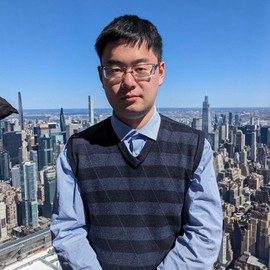
Speaker: Jin-Peng Liu
Affiliation: Massachusetts Institute of Technology
ABSTRACT:
Nonlinear dynamics play a prominent role in many domains and are notoriously difficult to solve. Whereas previous quantum algorithms for general nonlinear equations have been severely limited due to the linearity of quantum mechanics, we gave the first efficient quantum algorithm for nonlinear differential equations with sufficiently strong dissipation. This is an exponential improvement over the best previous quantum algorithms, whose complexity is exponential in the evolution time. We also established a lower bound showing that nonlinear differential equations with sufficiently weak dissipation have worst-case complexity exponential in time, giving an almost tight classification of the quantum complexity of simulating nonlinear dynamics. Furthermore, we design the first quantum algorithm for training classical sparse neural networks with end-to-end settings.. We benchmark instances of training ResNet from 7 to 103 million parameters with sparse pruning applied to the Cifar-100 dataset, and we find that a quantum enhancement is possible at the early stage of learning. Our work shows that fault-tolerant quantum computing can contribute to the scalability and sustainability of most state-of-the-art, large-scale machine learning models.
References:
[1] Efficient quantum algorithm for dissipative nonlinear differential equations, Proceedings of the National Academy of Science 118, 35 (2021), arXiv:2011.03185.
[2] Towards provably efficient quantum algorithms for large-scale machine learning models, arXiv:2303.03428.
BIO:
Jin-Peng Liu is an incoming faculty at Tsinghua. He is a postdoctoral associate at the Center for Theoretical Physics, MIT in 2023-2024 (hosted by Aram Harrow). He was a Simons quantum postdoc fellow at Simons Institute, UC Berkeley in 2022-2023 (hosted by Umesh Vazirani and Lin Lin). He received a Ph.D. in applied math at University of Maryland in 2022 (advised by Andrew Childs). He received a B.S. in math at Beihang and Chinese Academy of Sciences Hua Loo Keng Class (supervised by Ya-xiang Yuan).
His research focuses on Quantum for Science. He attempts to develop, analyze, and optimize provably efficient quantum algorithms for challenges in natural and data sciences, including topics: : (i) robust quantum simulations; (ii) efficient quantum scientific computation; (iii) scalable quantum machine learning, toward end-to-end applications in areas such as quantum chemistry, biology and epidemiology, fluid dynamics, finance, and machine learning. His work was highlighted by Quanta magazine. Jin-Peng is serving as an editor of Quantum (Q1, IF:6.777). He received NSF RQS seed grant (CO-PI), NSF QISE-NET Triplet Award, and James C. Alexander Prize.
Hosted by Professor Quanquan Gu
Date/Time:
Date(s) - Oct 05, 2023
4:15 pm - 5:45 pm
Location:
3400 Boelter Hall
420 Westwood Plaza Los Angeles California 90095
